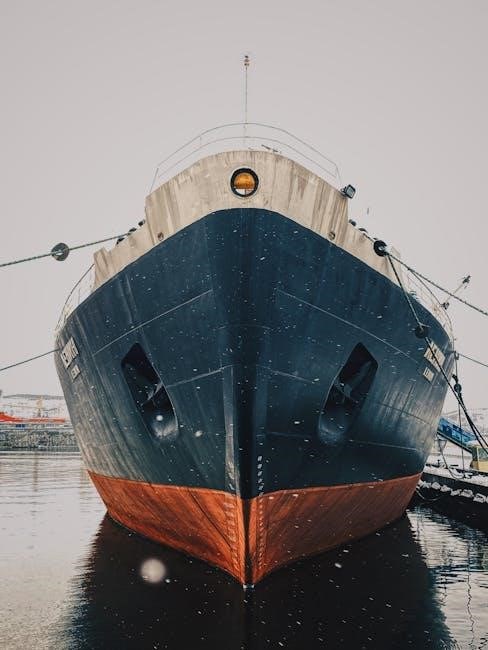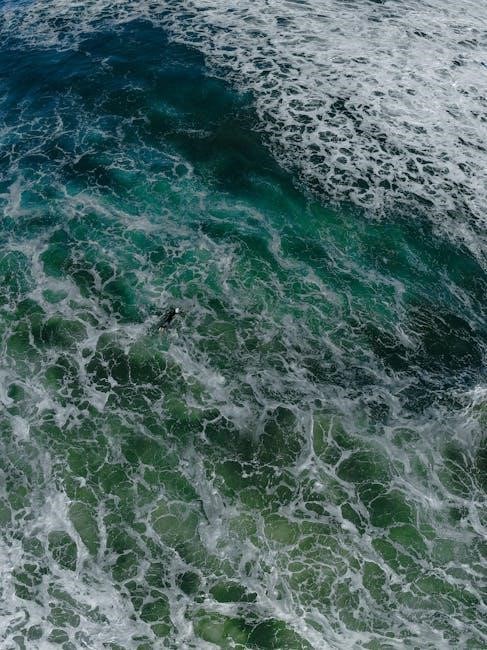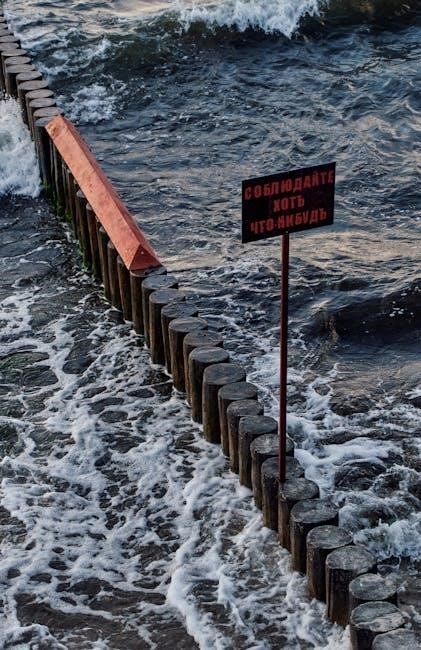The sea has historically been central to Russia’s national security, economic interests, and geostrategic ambitions, reflecting its enduring importance in shaping the country’s global influence.
1.1 Historical Context of Russian Maritime Power
Russia’s maritime power traces its roots to Peter the Great’s efforts to establish a naval presence, marking the beginning of its strategic importance. The Soviet Union further expanded naval capabilities, projecting power globally. Post-Soviet decline led to reduced influence, but recent efforts aim to revive and modernize naval capabilities, emphasizing the Arctic and Pacific regions, aligning with contemporary geopolitical goals and energy strategies.
1.2 The Significance of the Sea in Modern Russian Policy
The sea remains a cornerstone of Russia’s modern policy, underpinning economic, strategic, and geopolitical objectives. Access to key waterways and resources, such as the Northern Sea Route, enhances energy exports and reinforces Russia’s position as a global maritime power. Naval presence in regions like the Arctic, Black Sea, and Pacific underscores Moscow’s commitment to safeguarding national interests and countering external influences effectively.

Evolution of Russian Sea Power Since the 1990s
Russian sea power faced post-Soviet decline, marked by economic challenges and reduced capabilities. The 2010s saw a revival with naval modernization and strategic investments to bolster influence.
2.1 The Post-Soviet Era and Naval Decline
The post-Soviet era marked a significant decline in Russian naval power due to economic collapse and reduced military spending. The once formidable Soviet Navy faced underfunding, outdated technology, and decreased shipbuilding. The 2000 Kursk submarine sinking symbolized this downfall. Russia struggled to maintain a blue-water navy, shifting focus to coastal defense and regional presence, adapting to its diminished capabilities.
2.2 Modernization and Revival of Naval Capabilities
Russia’s naval modernization began in the mid-2000s, driven by increased energy exports, Arctic interests, and geopolitical tensions. The Navy prioritized submarine production, including nuclear-powered subs like the Borei-class, and invested in advanced missiles and shipbuilding. This revival aimed to project power globally, secure maritime regions, and ensure strategic deterrence, reflecting Moscow’s ambition to reestablish itself as a major maritime power.

Key Themes in Russian Maritime Strategy
Russia’s maritime strategy emphasizes the Northern Sea Route, energy export routes, Arctic resource development, and strategic bomber patrols to project power and secure vital economic and geopolitical interests.
3.1 The Role of the Northern Sea Route
The Northern Sea Route (NSR) is a vital component of Russian maritime strategy, offering a shorter trade corridor between Europe and Asia. Climate change has reduced ice cover, increasing its viability for navigation. Russia leverages the NSR to enhance energy exports, particularly oil and gas, while strengthening its geopolitical influence in the Arctic region and bolstering its position as a global maritime power.
3.2 Strategic Importance of the Kuriles and Pacific
The Kuril Islands and the Pacific region hold significant strategic value for Russia, providing access to vital trade routes and resources. Moscow seeks to assert dominance in the Pacific, ensuring security for its eastern territories and projecting power. The Kuriles serve as a buffer against external threats while facilitating Russia’s presence in the Asia-Pacific, aligning with its broader goal of becoming a major maritime power.
Regional Focus Areas in Russian Naval Strategy

Russia’s naval strategy emphasizes key regions like the Arctic, Black Sea, and Pacific, ensuring strategic dominance, resource control, and geopolitical influence in these critical maritime areas.
4.1 The Arctic and Its Geostrategic Significance
The Arctic holds immense geostrategic importance for Russia, offering new trade routes via the Northern Sea Route and access to untapped energy resources; Climate change has increased navigability, enabling Russia to project power and secure its economic interests in the region while countering competitors like NATO. This area is crucial for Moscow’s long-term maritime and energy strategy.
4.2 The Black Sea and Mediterranean Presence
Russia’s Black Sea presence is vital for projecting power into the Mediterranean, ensuring access to strategic ports and influencing regional stability. Naval deployments and strategic bomber patrols underscore Moscow’s commitment to securing its southern flank amid NATO’s growing presence, reflecting the Black Sea’s role in broader maritime and geopolitical strategies.
Military and Strategic Dimensions
Russia’s maritime strategy emphasizes naval capabilities and strategic bomber patrols to assert presence and protect national interests, ensuring security in key regions and international waters.
5.1 Strategic Bomber Patrols Over Key Seas
Strategic bomber patrols by Tu-95MS and Tu-160 aircraft over key seas like the Norwegian and Sea of Okhotsk demonstrate Russia’s commitment to maritime security and deterrence. These flights, often conducted in international waters, underscore Moscow’s ability to project naval power and safeguard national interests.
5.2 Naval Deployments and Exercises in International Waters
Russia’s naval deployments and exercises in international waters, such as the Sea of Okhotsk and the Black Sea, demonstrate its commitment to maintaining a robust maritime presence. These operations, including Ocean-24 drills, highlight Moscow’s ability to project power and ensure security in key strategic areas while adhering to international maritime norms.
Economic and Environmental Aspects
Russia’s maritime strategy emphasizes the Northern Sea Route’s economic potential and environmental protection, balancing energy exports with climate change mitigation and maritime safety initiatives.
6.1 Energy Strategy and the Northern Sea Route
The Northern Sea Route (NSR) is pivotal to Russia’s energy strategy, offering a shorter trade route for oil and gas exports while leveraging melting ice to enhance economic competitiveness and global energy influence.
6.2 Environmental Protection and Maritime Safety
Russia emphasizes environmental protection and maritime safety, addressing climate change impacts on Arctic waters and ensuring safe navigation through the Northern Sea Route. Stringent regulations and advanced technologies aim to mitigate ecological risks while balancing economic activities, reflecting a commitment to sustainable maritime practices in line with global standards.

The Role of the Sea in Russia’s Energy Strategy
The sea is crucial for Russia’s energy exports, with the Northern Sea Route enabling efficient transportation of oil and gas, securing Russia’s position as a global energy powerhouse.
7.1 Oil and Gas Export Routes
Russia relies heavily on maritime routes for its oil and gas exports, with the Northern Sea Route gaining prominence due to climate change. This Arctic passage reduces transportation time and costs, enhancing Russia’s energy competitiveness. Additionally, strategic ports like those in the Baltic and Black Seas serve as critical hubs for exporting hydrocarbons to global markets, ensuring energy security and economic stability. This underscores the sea’s vital role in Russia’s energy strategy and geopolitical influence.
7.2 Future Prospects for Arctic Resources
The Arctic region holds significant potential for Russia’s future energy strategy, with vast untapped hydrocarbon reserves and mineral resources. Climate change is opening new opportunities for exploration and extraction, particularly in the Northern Sea Route. Russia is investing heavily in Arctic infrastructure to support these activities, positioning itself as a key player in the global energy market while balancing environmental and technological challenges.
Russia’s Maritime Ambitions in the 21st Century
Russia aims to strengthen its global maritime influence through strategic naval modernization, Arctic expansion, and enhanced presence in key regions like the Pacific and Atlantic.
8.1 Positioning Russia as a Global Maritime Power
Russia seeks to assert itself as a dominant maritime power by modernizing its navy, expanding its Arctic presence, and securing strategic bases worldwide to project influence and safeguard economic interests.
8.2 Challenges and Opportunities in a Changing World Order
Russia faces challenges like geopolitical tensions, sanctions, and NATO expansion but leverages opportunities such as Arctic access and strategic partnerships to strengthen its maritime influence and secure resources.

The Sea in Russian Strategy: Future Outlook
Russia’s maritime future hinges on technological advancements, climate change adaptation, and leveraging the Northern Sea Route for sustainable development and strategic influence in a shifting global landscape.
9;1 Technological Advancements and Naval Modernization
Russia is prioritizing naval modernization through advanced technologies, including hypersonic missiles and quiet submarines, to maintain maritime superiority. Investments in automation and AI are enhancing operational efficiency, while the development of the Northern Sea Route infrastructure supports economic and strategic goals, ensuring Russia’s competitive edge in a rapidly evolving global maritime environment.
9.2 Adapting to Climate Change and New Threats
Russia is addressing climate change’s impact on its maritime strategy, particularly through the Northern Sea Route’s expanding accessibility. Environmental protection measures and enhanced maritime safety protocols are being implemented to mitigate risks. Additionally, Russia is adapting to emerging threats, including cybersecurity challenges and geopolitical shifts, ensuring its naval capabilities remain resilient and responsive to a changing global security landscape.
The sea remains a cornerstone of Russian strategy, ensuring national security, economic stability, and global influence, while addressing emerging challenges and opportunities in a dynamic world.
10.1 The Enduring Importance of Maritime Power in Russian Strategy

Russia’s maritime power remains vital for national security, economic stability, and global influence. The sea connects strategic interests, from energy exports to military presence, ensuring Russia’s role as a global power. Strategic bomber patrols, naval deployments, and the Northern Sea Route underscore its enduring relevance. Future challenges, such as climate change and technological shifts, will test but not diminish its importance.